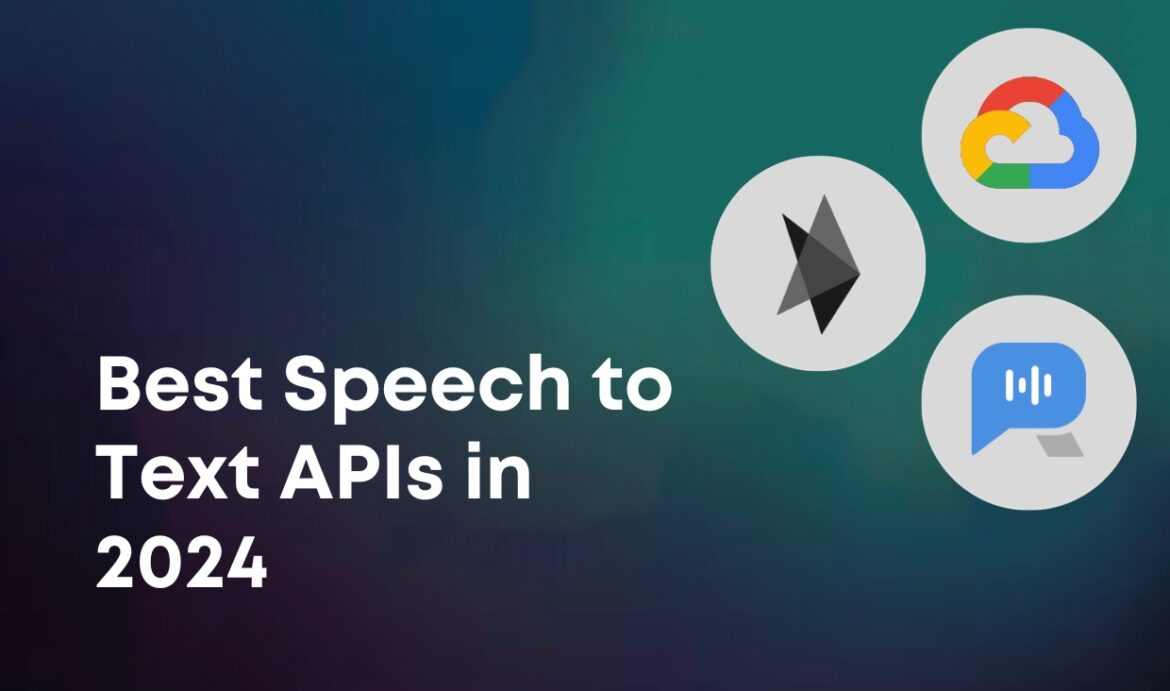Speech-to-text (STT) APIs offer users and organisations a solution for converting spoken audio files to text using AI. This provides a quicker yet accurate means of transcribing than human transcriptions.
However, not all STT APIs offer the same quality. You may face inaccurate transcriptions, low processing time, and latency issues. So, this article presents the five best speech-to-text APIs for use, including the best free speech-to-text API. We have included their features, perks, and drawbacks to help you make an informed decision.
What is Speech-to-text?
Speech-to-text (STT) technology, also known as Automatic Speech Recognition (ASR), enables you to transcribe a speech into written text. Application Programming Interface (API) designed for speech-to-text turns your audio input into written text using machine learning or a legacy technique.
The Top 5 Speech to Text APIs in 2024
Here are some of the top speech to text APIs in 2024:
1. iFLYTEK Speech-to-Text API
iFLYTEK is a Chinese-owned information technology company. The iFLYTECK has one of the best speech to text APIs for businesses and developers. It provides highly accurate API speech to text conversions of pre-recorded speech audio and live streams.
Key Features
- High Recognition Accuracy:This speech to text API offers over 97{a914b1e9acb01c6024b4ce88aed1d09a4e667bf7becf66b0d2e95e1a2537bf86} accuracy for Chinese Mandarin and over 90{a914b1e9acb01c6024b4ce88aed1d09a4e667bf7becf66b0d2e95e1a2537bf86} for English.
- Multi-Language Support:iFYTEK currently supports 15 languages and can recognise various dialects in China.
- Various Industries Coverage:This API offers customized recognition for specific industries like business, music, and video playing through continuous training and optimization of models.
- Self-learning Platform:It’s an open platform where you can specify hot words and upload business-related data to build specific models for greater accuracy.
- Real-time Subtitling:iFLYTEK STT provides real subtitling during live broadcasts.
Pros
- High recognition accuracy
- Easy scalability
- Customer support
- Open source
- Developer friendly
Cons
- Fewer languages
2. Deepgram Speech to text API
Deepgram is one of the most common speech to text API providers, and Deepgram is a top speech-to-text API. They offer several classes of deep-learning-based transcription models. They include Base, Enhanced, Nova-2, and custom model training.
Deepgram speech to text converter API transcribes speech-to-text with high accuracy and speed, making it a top choice.
Key Features
- Language Detection: Deepgram STT API can identify and convert over 30 languages and dialects into written text, making it a versatile API speech to text.
- Speech Understanding: It possesses speech understanding capabilities through AI language models to get key topics and insights from speech. It then provides summaries of the audio content.
- Speaker Diarization:Deepgram can identify multiple speakers, ensuring you can analyse audio with different speakers.
- Custom Model Training: Deepgram’s custom model training feature allows industries to train the APO to improve accuracy regarding accents or domain-specific jargon.
- Topic Detection: The API can identify and label the primary topics in audio content.
Pros
- High accuracy
- Fast speed
- Low cost
- Flexible features
- Developer friendly
- Real-time processing
- Excellent customer support
- Customizable model
Cons
- Supports fewer languages
- Learning curve (it may not be so beginner-friendly)
- Occasional processing errors
3. Assembly AI
Assembly AI is a speech to text free API that transcribes speech content to written text. It understands speech and also enables users to gain insights from voice data.
Key Features
- Async Transcription: AssemblyAI API can transcribe pre-recorded audio or video files in seconds.
- Speaker Diarization: The API can automatically detect different speakers in audio content and distinguish their words for better accuracy.
- International Language Support: It currently supports 20 languages, with more being added over time.
- Automatic Language Detection: AssemblyAI API automatically detects the prominent language in audio and sends it to the appropriate model for transcription.
- Automatic Filtering, Punctuation, and Casing: The API automatically filters and replaces profanity. It also includes punctuation where missing and capitalises proper nouns.
Pros
- Easy to integrate
- Developer-friendly documentation and SDKs
- Good accuracy
- Fast speed
- Offers several models
Cons
- Models are not open-source
- The accuracy level is mid-level in some use cases.
- Limited languages
4. Speechmatics
Speechmatics speech to text converter API uses deep learning capabilities to transcribe human spoken audio into text format regardless of demographic, gender, age, dialect, and accent. One of its best features is that it supports transcriptions for up to 50 languages, including their dialects.
Key Features
- Real-time transcription:Speechmatics provides real-time transcription in seconds. Its context accuracy improves over time.
- Customisation: Its customisation feature supports high accuracy when using the most unique words and phrases.
- Speaker Labels: Speechmatic uses speaker labelling to identify different speakers in batch and real-time transcriptions.
- Formatting and Presentation: The API filters profanity, adds and corrects punctuations, and formats dates and numbers for better transcription.
- File Format Support: It supports all the major audio and video formats. Hence, you need fewer resources to prepare files.
Pros
- Multiple language support
- Good accuracy for British accents
- Satisfactory accuracy for non-English languages.
- Real-time transcription
Cons
- Slow speed
- High cost
- Limited customization
- Gated free trial and pricing
5. Microsoft Azure STT
Microsoft Azure STT is a Microsoft API speech to text that is ideal for various use cases. It supports about 100 languages and dialects, making it a global STT solution. Microsoft Azure also offers high accuracy and speed.
Key Features
- Multi-language Support:It supports about 100 languages and several language variants.
- Customisable Models: You can add specific words to your base vocabulary or build your models.
- Flexible Deployment: You run speech-to-text anywhere in the cloud or at the edge in containers.
- Accurate Transcription from Various Sources: Convert audio to text from various sources. It also uses diarisation to identify different speakers.
- Tailored for Various Industries: You can tailor your speech models to understand industry and organization-specific vocabulary.
Pros
- Diverse source compatibility
- Multi-Language support
- Real-time streaming support
- Security and scalability
- Good accuracy
Cons
- Limited voice recognition features and custom models
- Developer friendly
- Expensive
- Slow speed for pre-recorded audio
- Real-time transcription latency issues.
Conclusion
Several speech-to-text APIs can convert your pre-recorded and real-time spoken audio into written text. We have created a list of five best speech to text APIs for you, including the speech-to-text API free for use. These APIs offer outstanding accuracy and unmatched speed to help you convert your audio files quickly.
Our review will help you determine which is best for you. Before choosing, consider the features, pros, cons, and price points. We recommend this speech-to-text API from iFLYTEK for businesses and developers.








